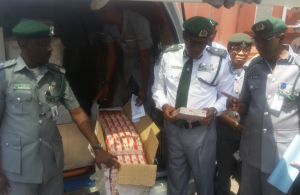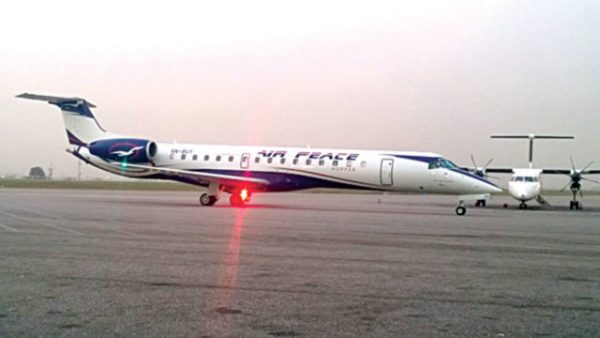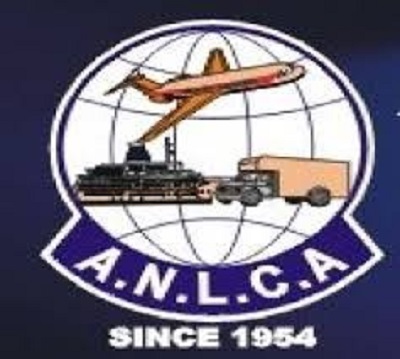Improved Cargo Traffic May Not Lead To Increased Revenue – Compt. Abba-Kura

By Kenneth Jukpor
Nigeria Customs Service (NCS) is still computing its cumulative revenue generated for the first half of 2019 but several Command’s have revealed theirs as most recorded increase in revenue generation when compared to 2018; however no Command’s report has been able to factor in the increased customs duty.
Recall that the Central Bank of Nigeria (CBN) on June 10th 2019 changed the exchange rate for Customs duty from N306 per dollar to N326 per dollar, without explaining the reason for the action.
This instantaneous increase in Customs duty by N20 has seen importers and their freight agents count losses, while the action provided a better platform for Customs to augment its revenue generation.
Although the increased duty has only lasted for six weeks, it is expected that the subsequent revenue breakdowns by the Customs reflect this increase to give a clearer illustration of how the revenue generated was attained and how it compares to the previous years.
Another index used to ascertain the size of revenue generated is the cargo traffic as higher imports generally leads to higher Customs duty collected and consequently more revenue generated.
However, contrary to the popular belief that increased cargo traffic at Nigeria’s port leads to higher revenue generation as a result of more duties, the Customs Area Comptroller (CAC) Apapa Customs Command, Compt. Mohammed Abba-Kura, has said that such perception could be misleading.
The Apapa CAC was speaking with MMS Plus on the sidelines as the Apapa Area Command displayed tramadol seizures that some suspects attempted to smuggle out of the port, using an ambulance.
Explaining some of the variables that affect Customs revenue generation, Abba-Kura said; “You may try to compare the volume of cargoes in previous years to what is obtainable now to explain the changes in revenue, however, sometimes the volume of cargoes may not tell the true story with regards to the impact on revenue generation. The revenue generation may not depend on the volume of cargoes because at certain times you may have more cargoes for imports that do not generate high Customs duty as the others”
He admitted that the Apapa Command didn’t factor in the new CBN exchange rate in its recent presentation of the 2019 Half Year revenue generated, which stood at two hundred and three billion, two hundred and sixty-four million, fifty-four thousand, six hundred and eighty- two naira, sixty-nine kobo (N203,264,054,682.69).
“We didn’t factor in the new CBN exchange rate because at the time we were compiling the revenue generated between January and June, the exchange rate wasn’t changed” the Apapa Customs boss said.
He also noted that the N203 billion collected represents 54.5% of the Command’s annual revenue target.
Speaking with MMS Plus recently on the impromptu increase in Customs duty by CBN, the Founder of National Association of Government Approved Freight Forwarders (NAGAFF) Dr. Boniface Aniebonam said; “It is unfortunate that CBN’s actions never allow international traders to plan. How can one wake up and change the rate of Customs duty? What happens to someone who has gone to a bank to borrow money and made his calculations on a particular rate before the sudden increase? Where would he get the money to pay the additional cost? These are some of the reasons goods are lying down in the ports. The consignments abandoned at Ikorodu are results of these kinds of decisions that aren’t in line with democracy and the rule of law”
Similarly, the Chairman of the Kirikiri Lighter Terminal (KLT) of the Association of Nigeria Licensed Customs Agents (ANLCA) Comrade Goddy Sewa Soleji noted that the policy was not right especially with the present economic situation in Nigeria.
“The economy does not call for that implementation by the CBN. Increasing exchange rate for cost of clearing is at a disadvantage to the stakeholders and the final consumers of the products and services. When the exchange rate is increased, the duty is increased and this will also affect the nation’s economy. If an importer goes to the market and purchased goods for $10 and pays his freight, duty and clears consignments, he must account for all he has spent in the importation. This is what he is going to consider before fixing the selling price,” he told MMS Plus.
“We don’t need this increment at this time. What we need is to manage what we have now. If in the nearest future, the economy becomes stable, then we can consolidate and do whatever we want in terms of exchange rate,” Soleji added.
The National President, Africa Association of Professional Freight Forwarders and Logistics of Nigeria (APFFLON) Mr. Frank Ogunojemite also frowned at the sudden increment by CBN.
“We are not happy about this. There should have been consultation before such decision is made but unfortunately, the critical stakeholders don’t take part in these decisions. The impact of this is that the prices are going to increase and the government recently talked about increase in minimum wage. Since they were hell-bent on increasing the duty, then there should have been a time limit given to the importers, business men and the citizens” he said.
“We were still complaining about the multiple charges by the customs. This increment came after the Customs said that they met their target. So what purported this increment? Does CBN plan to intentionally create problems for the citizens of the country?” he queried.
Meanwhile, the Apapa Customs Command Spokesperson, Mrs. Nkeiru Nwala said the Command still meets and beats its revenue targets irrespective of the CBN policy.
“While the government is still reviewing this, as Customs officers our job is to enforce the collection of this duty. We don’t make these laws, we only implement them” she said.







